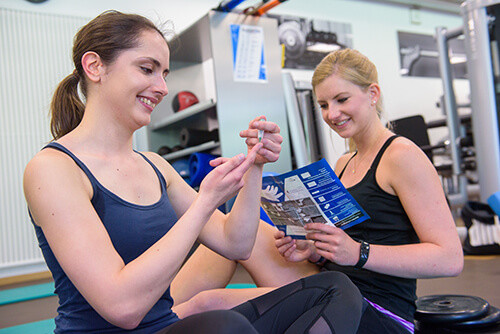Cebit 2018: Molecular fitness test for amateur athletes

The molecular fitness test of the German start-up InFit is based on blood tests and a corresponding app.
One third of Germans are wearing a fitness tracker on their arm, according to a survey by the industry association Bitkom. The Saarbrücken start-up “InFit” goes even further. By analyzing novel biomarkers in collaboration with researchers from the Center for Bioinformatics at Saarland University, they provide a molecular fitness test that only top athletes have enjoyed so far. The corresponding app not only shows the molecular results, but also suggests training plans. 1000 samples from 300 subjects form the basis for this. As of June 11, the founders will present their app for the first time at the international computer trade fair Cebit in G75, Hall 27.
“Sport is a helpful therapy for many diseases, and it protects against cardiovascular diseases,” explains Andreas Keller, Professor of Clinical Bioinformatics at Saarland University. Whether someone is fit can be assessed using data on distance traveled or heart rate under load. Fitness trackers log this data. Professor Keller wants to add “molecular biomarkers” as a new category. Biomarkers are biological traits that also provide physicians with clues about a patient’s health or illness. Professor Keller is therefore researching short, non-coding ribonucleic acids, also called microRNAs.
With them, in the future, every athlete, whether professional, ambitious amateur or beginner, will get even better information about their own fitness.
To realize his vision Keller founded the start-up “InFit” in July of this year together with Artur Suleymanov and former German decathlon champion Simon Hechler. The company sends blood tests that can be done at home. Participants prick their fingers four times a year with the help of a kit provided, place a drop on a special storage medium and send the blood sample by post to a molecular diagnostic analysis laboratory. “The service provider adheres to the same standards of analysis that apply to medical diagnostics. This also includes data protection requirements,” Keller explains.
The respective participants get access to the results of the analysis via the InFit app. This is designed for both the iOS and Android operating systems, has been tested several times and will be made available to test users in the coming days.
The app combines the molecular results with the data of the body-worn fitness tracker. As a result, tailor-made training plans can be called up on the app, which also takes into account constraints such as training location, available time and desired intensity.
At the end of this year, the InFit app and its services will be on the market. At the moment, the founders are holding talks with potential investors, for example at the alumni pitch of the WHU-Otto Beisheim School of Management. The InFit founders are supported by the on-campus “IT Incubator”, an institution of Saarland University and Max Planck Innovation GmbH. During the so-called incubation phase, researchers and students receive help there to develop their ideas entrepreneurially.
Press photos: www.uni-saarland.de/pressefotos
Press inquiries:
Professor Andreas Keller
Center for Bioinformatics
Saarland Informatics Campus
E-mail: andreas.keller@ccb.uni-saarland.de
Phone: +49 681 302 68611
Editor:
Gordon Bolduan
Science Communication
Saarland Informatics Campus E1.7
E-mail: bolduan@mmci.uni-saarland.de
Phone: +49 681 302 70741
Die Öffentlichkeitsarbeit am Saarland Informatics Campus wird unterstützt durch das Kompetenzzentrum Informatik Saarland, gefördert aus Mitteln des Europäischen Fonds für regionale Entwicklung (EFRE) und Mitteln der Staatskanzlei Saarland.


